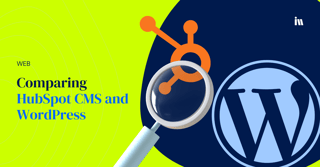
Your website is one of the most important assets to your business. It should be your #1 sales rep working 24/7 to communicate your business to the world. Long gone are the days of simply having a “brochure” website. The game has changed and if your website isn’t actively engaging your audiences, educating them, and converting them into leads, you’re leaving a lot of opportunity on the table. The most effective websites are constantly growing with relevant content, optimizing for performance and continuously striving to connect with target personas on an increasingly deeper level. In order to do all this, your website needs to have optimal usability, be accessible, and you’ll need senior level coding skills. That is unless you use a content management system. But what is that and how do I know which one is right for me?
What is a CMS
A content management system (CMS) is a platform in which a website is hosted. A CMS makes it easy to manage the settings and content of your website in a user friendly interface. There are many CMS or website builders on the market. You may have heard of Wix, SquareSpace, WebFlow, WordPress and of course HubSpot.
There are different tiers of CMS depending on the capabilities you’re looking for. Some CMS like Wix are fairly limited because they provide a very rigid framework to work within. For someone who is looking to leverage a pre existing template with minimal customization to get a website up quickly, this is a good choice. For those that wish to have a more customized website with greater control over the design and functionality, you’ll need to look at more advanced options. In this article, we will compare two of the most popular options WordPress and HubSpot CMS.
HubSpot
HubSpot has become a strong leader in the software space. As a platform solution that can serve all aspects of business HubSpot has been revolutionizing front office marketing and sales operations. With different “hubs” to serve different areas of your business, their CMS hub has evolved in recent years to become what we believe is the best CMS on the market today.
Pro’s - Above and beyond all other CMS platforms, HubSpot’s usability is second to none. Their CMS is “built for marketers”. Meaning non technical users can easily build new pages, update content, implement smart content, run A/B tests and more without ever knowing how to code. However, HubSpot has done an amazing job at giving those highly technical users direct access to code and advanced development processes. So you get the benefit of a user friendly platform that doesn’t sacrifice on advanced capabilities. Additionally, being part of the larger platform, websites hosted on HubSpot are intimately connected with all other tools from sales, marketing, ops and service teams allowing for an extremely dynamic website that integrates with the rest of your front office.
Cons - HubSpot is a premium solution. Although they do have a limited free and starter level package, to access the majority of tools, their Pro plan is $400/mo. However, that does include all hosting, SSL, and no rate/bandwidth limitations that you may have to pay extra for with other providers. Additionally, some non-website functionalities like email marketing, nurturing automation, etc. may require additional hubs as HubSpot doesn’t support the addition of numerous plugins like WordPress does.
WordPress
WordPress is arguably the most popular CMS in the market today. WordPress’ primary focus is being open sourced. For developers and technical users, this is a high value point as it allows for more customization and freedom to choose your hosting. You can host a WordPress site on your own server or leverage a hosting provider similar to WP Engine.
Pro’s - With WordPress being totally open sourced, the world is your oyster. You have the option of installing various different “builders” or WYSIWYG editors. Additionally, you can find a plugin for just about anything. Forms, email marketing, security, SEO tools, etc. can all be bolted onto your WordPress site by installing a plugin.
Cons - Although there are some very user friendly WYSIWYG editors, the majority of WordPress sites will still require some basic coding and development skills to really customize the site. It may be difficult for non-developer users to spin up new pages without a familiarity with WordPress development. Additionally, although you can find a plugin for anything, those plugins often come as an additional paid service and require continuous updating and monitoring.
Major Benefits of HubSpot
Content management usability -
HubSpot has become known for its easy to use user interface and has taken steps to ensure a consistent user experience across all their hubs. This is no different for CMS. For HubSpot users, adopting the CMS is as familiar as working in Marketing or Sales hubs. You have the integrated access to things like forms, cta’s and smart content that are directly tied to contact properties and activity stored on contact records.
Additionally, in the last 2 years, HubSpot released HubSpot Themes. This is their current version which supports super easy drag and drop capabilities. No longer do users need to edit templates or modules at the code level. By giving access to a module library, page layouts can be created and/or updated quickly without ever needing to look at the code.
For advanced users, HubSpot provides access to all raw code in terms of HTML files, CSS and JS libraries. Although you do not have direct access to the server, HubSpot does provide you a CLI which allows for local development to be pushed into HubSpot. This gives developers limitless access to create their own elements in their preferred development environment, then push into HubSpot.
Security -
A big advantage that HubSpot has over WordPress is the emphasis on security. Because WordPress is open sourced, owners need to take great care in securing their sites. Just this year Thousands of WordPress Sites Hacked to Redirect Visitors to Scam Sites. At minimum, we recommend all WordPress sites include the paid plugin WordFence. This gives WordPress sites some basis of security and monitoring. But owners need to also consider the security of their hosting server. Self hosted servers require a lot more hands-on efforts to maintain security.
With infrastructure security, data & application protection and 24/7 monitoring and incident response all included with your hosting, you never need to worry about managing the security of your website. In addition, compliance is a breeze. Fortunately HubSpot is SOC 2, Type 2 and SOC 3 compliant, and they provide GDPR tools to CMS users to ensure their compliance as well. You also get a free SSL provided with your hosting which alleviates the need to purchase and renew a separate SSL through your registrar.
Reliability -
Fortunately with HubSpot, content is hosted over a secure content delivery network (CDN). This allows you to scale your content and ensure your website loads quickly for users all over the world. Being hosted on AWS with data hubs around the globe, if there is an issue with one server, your content will be routed through a different server to maintain uptime. There is no setup or configuration required on your part.
The system takes care of distribution and cache invalidation for you so you can focus on building a great site while a web application firewall and built-in security measures provide peace of mind against online attacks. - HubSpot Developers
If a major incident occurs, you can rest easy knowing your data has been replicated across 3 data centers. If one goes down, processing is switched to another to minimize any interruptions. With hourly and daily backups of each data center, you will always have access to the latest information stored across HubSpot.
Clearly HubSpot is a superior choice
Your website is arguably one of the most critical elements of your business. Ensuring it is safe, secure and operational can be a big challenge. But one that is non negotiable. Same goes for ease of use when managing your content. In today’s fast paced workplace, marketing teams don’t have time for the overhead admin of maintaining the security of their site, constantly updating plugins and outdated add-ons, remembering to take periodic backups of their content, their server and more. Likewise, the reliance on a dev team to make simple updates and manage the sales and marketing aspects of a site can be time consuming and costly.
That’s why we firmly believe that HubSpot’s CMS is the best in breed on the planet. From a feature set, customizing ability to design and develop any site you can dream up, and a foundational infrastructure perspective, they simply can’t be beat.
If you’re interested in redesigning your website onto the HubSpot CMS, feel free to reach out and we’ll be happy to discuss options.

